A recruiter sits in front of a huge pile of applications. He takes the first twenty and throws them in the bin, unseen. His reasoning: “They’re unlucky and we don’t need unlucky people.”
As this little joke shows, the start of an application process is a bit of a challenge. What is luck in this? What is skill? What can I influence and what not? Applicants probably always ask themselves these questions. And that’s why almost no one likes to write applications. For people who want to come to Germany from abroad or are new here, such an undertaking is also fraught with many other questions: For example, what does “m/w/d” mean in job advertisements? What are German language skills at level A1, A2, B1, B2, C1 and C2? Or: How do I get a work visa?
Internationality expressly desired
In addition, there are sometimes doubts and uncertainties, such as: Are there prejudices against my name, my photo, my origin? This is also what Joanna Pawlaczek, employee of the Jena “Welcome Center”, tells us: “In Germany, the anonymous application is not yet widespread, and the use of an application photo is also welcomed. The latter is a taboo in other countries, for perfectly understandable reasons.” As an expert in international recruitment of skilled workers, Joanna, who was born in Poland, has already had her own experiences with these uncertainties. She rarely sees job advertisements in Jena with the addition: Applicants with a migrant background are expressly welcome.

A simple formulation that nevertheless encourages people with a migrant background. She recalls: “In Berlin, where I worked for a few years, it was already more common to use such formulations. It made me feel more directly addressed, gave me the feeling that I was explicitly wanted. So at first I had no intention of applying in Jena.” The advertisement for the newly founded “Welcome Center Jena” did not contain such an addition. She dared to apply anyway and was successful with her profile. Now she wants to create more awareness for this topic in her new job. This also includes breaking through unconscious thought patterns and prejudices and encouraging a constructive approach to conflicts.
Win-win situation
The employees of the “Welcome Center Jena” have been active for several months now. They hold workshops, advise students, migrants and job seekers who came to Germany and Jena because of their partners. They explain the special features of the application process and provide information about specific formalities. Even in the middle of the pandemic. Then by video conference. The experts for recruiting international skilled workers also sensitise companies to the issue of diversity. “Employers and employees with a high degree of self-reflection, an awareness of the effects of unconscious thought patterns and good language skills are very well prepared for working in international teams,” confirms team partner Cornelia Meyerrose. “When competing for the best talents, the companies that have international and diverse teams score points. From our point of view, there is not THE one solution. During the consultation, we share our knowledge and experience and thus accompany each individual path.”




